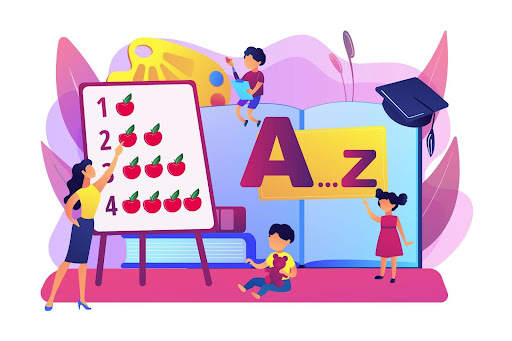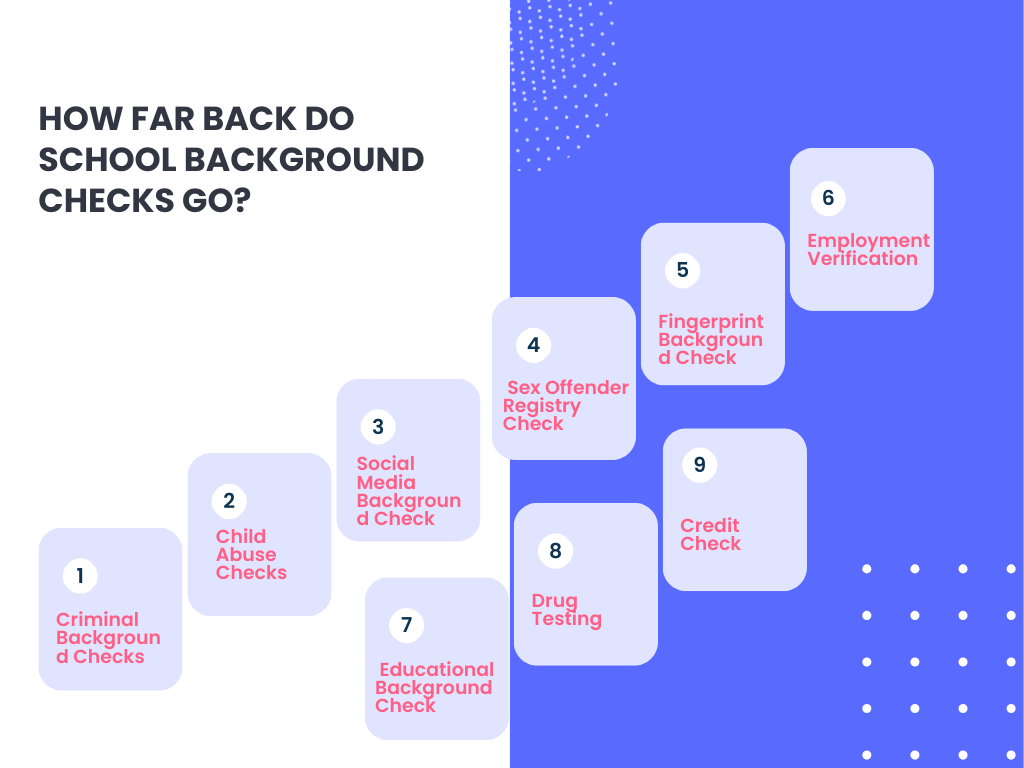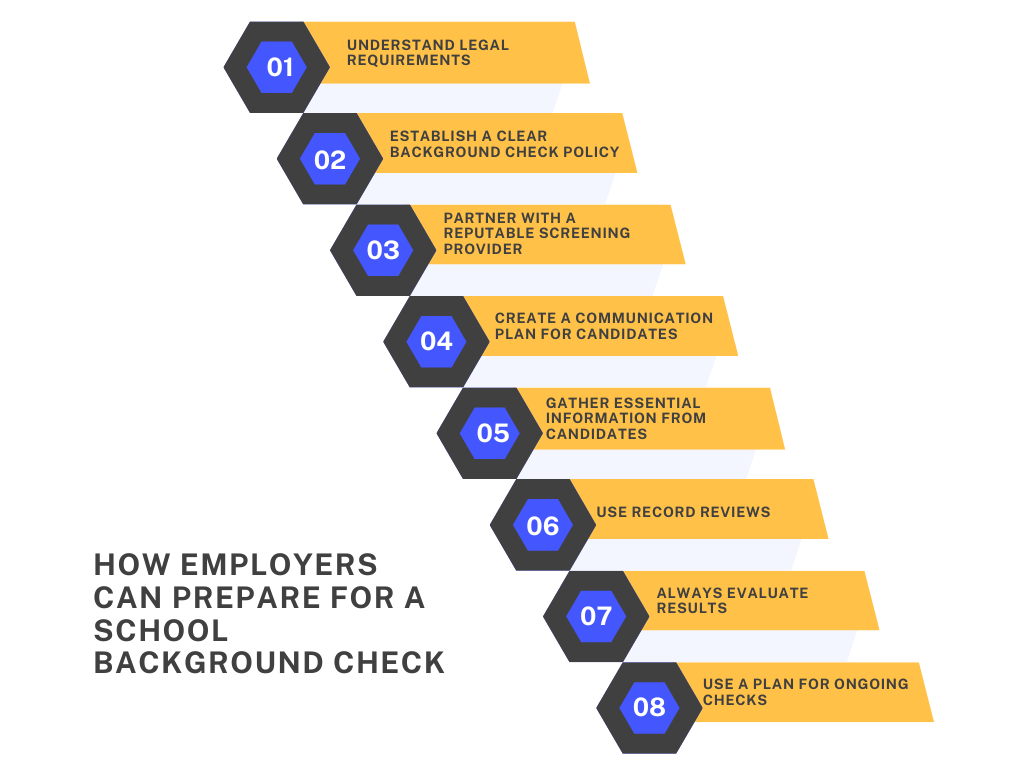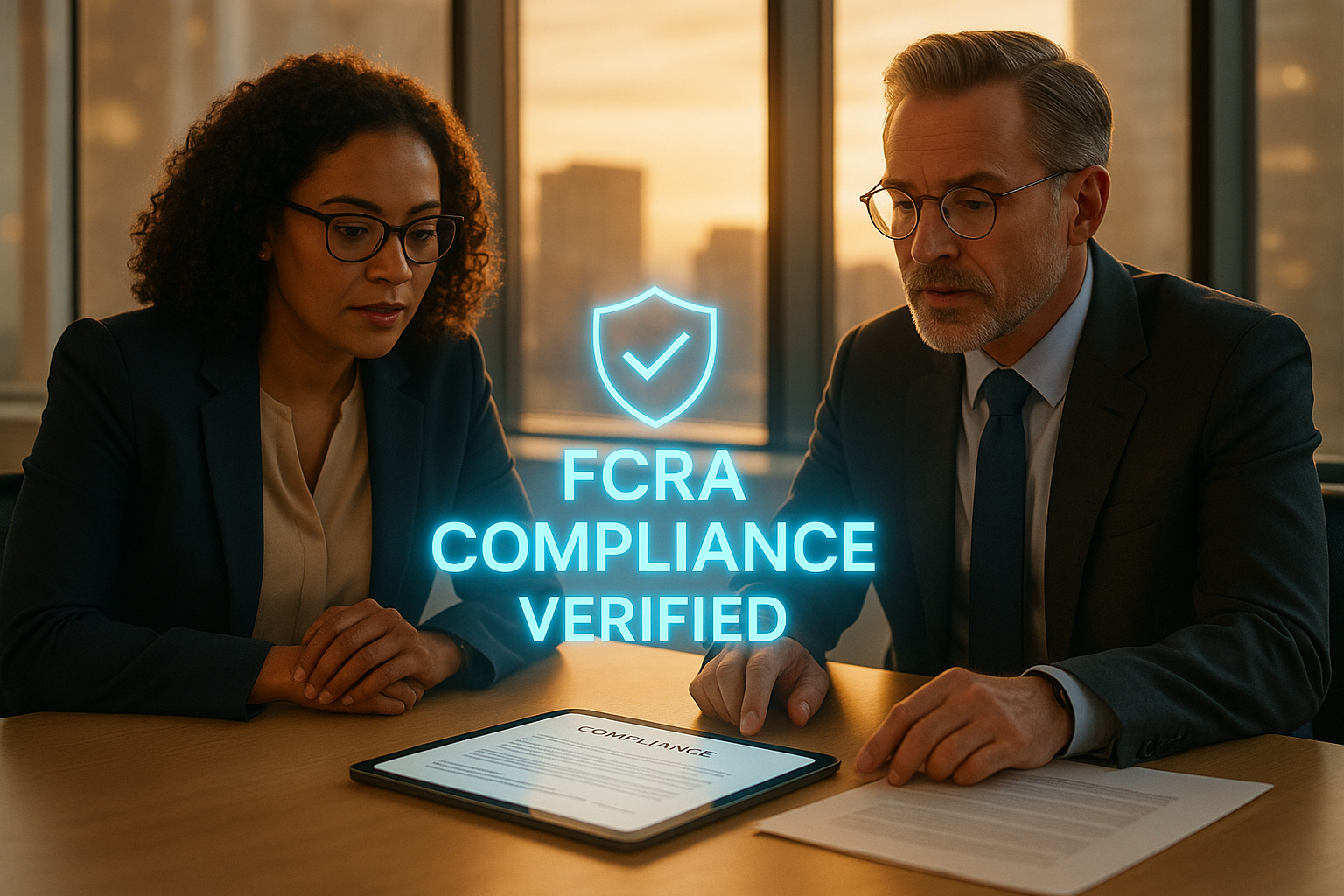How Far Back Does a School Background Check Go?

Are you concerned about hiring someone with a hidden past that could threaten your workplace’s safety? Understanding how far back a school background check goes can help you make informed decisions, avoid costly mistakes, and reduce hiring bias.
Most background checks have a lookback period of 7 years. However, several factors determine how far back a background check can go. These factors include the type of check, legal requirements, and the purpose of the check. For schools, ensuring a safe and qualified workforce often requires a thorough review of a candidate's background, sometimes extending beyond the standard 7-year period.
Background checks are vital for maintaining the integrity of work environments, especially educational institutions. From verifying education to reviewing criminal records, these checks play a key role in the hiring process. To understand more, check out our detailed guide on a background check.
What is an Education Background Check?
An education background check shows information about a candidate's education history, such as dates of attendance, majors, graduation dates, and degrees or certificates earned. For graduates, verification focuses on the most recent school attended.
A complete education background check for teachers may also include:
- Comprehensive criminal background checks, including a review of the sex offender registry.
- Verifying a candidate's educational history, such as schools attended, attendance periods, and degrees obtained.
Education background checks also help verify education, ensuring that applicants have the qualifications required for teaching roles. Improve your hiring process with Ferretly's AI-powered background checks.
Why Do Schools Perform Background Checks?
Like most employee background screenings, teacher background checks verify employment history to confirm previous experience and the accuracy of listed qualifications.
Schools perform these checks to maintain a safe environment for students and staff, identify any past legal issues, and ensure that teachers meet state-mandated requirements.
- Ensure Student Safety: Protect students from individuals with harmful backgrounds.
- Comply with Legal Requirements: Meet state and national regulations for child safety.
- Safeguard the School’s Reputation: Avoid damage to trust and credibility among parents and the community.
- Verify Professional Qualifications: Confirm certifications, educational credentials, and prior experience.
- Minimize Liability Risks: Reduce the risk of lawsuits or claims due to negligent hiring.
- Foster Transparency and Trust: Build confidence among staff, parents, and stakeholders.
- Identify Substance Abuse Risks: Screen for drug or alcohol-related concerns to ensure staff suitability.
- Screen for Criminal Offenses: Check for any criminal history, particularly violent or abusive behavior.
- Prevent Sexual Misconduct: Cross-check candidates against sex offender registries.
- Assess Character and Performance: Use reference checks to evaluate behavior and reliability in past roles.
How Far Back Do School Background Checks Go?

An education background check verifies if the applicant attended the stated institutions, and confirms degrees, training, certifications, and attendance dates. These checks can include official records as far back as required.
School background checks are guided by state and federal laws, along with the hiring institution's specific policies.
1- Criminal Background Checks
These checks include US Federal Criminal and Civil Searches, Credit Reports, 7-Year Felony, Verified National Criminal Searches, References, and County Civil Searches.
Criminal background checks are a crucial part of the hiring process, especially for roles involving access to sensitive information or vulnerable individuals, such as in schools or childcare settings. These checks typically cover:
- Federal Criminal and Civil Searches: Examine offenses and legal disputes handled at the federal level.
- Credit Reports: Provide insight into financial responsibility, which may be relevant for roles involving fiscal duties.
- 7-Year Felony Records: Investigate felony convictions over the past seven years, as permitted by state laws.
- Verified National Criminal Searches: Access a comprehensive database to identify criminal records across the U.S.
- Reference Checks: Validate an applicant's character and reliability through direct communication with previous employers or associates.
- County Civil Searches: Review civil cases filed at the county level, such as lawsuits, restraining orders, or disputes.
These checks not only protect organizations from potential risks but also ensure compliance with state and federal regulations. For schools, they help maintain a safe environment for students and staff, aligning with the institution’s duty of care.
2- Child Abuse Checks
Most states authorize a statewide central registry to list child maltreatment records centrally. These records are checked to ensure the safety of children in schools.
Child abuse checks are a important component of background screenings, particularly for positions involving direct interaction with children. Most states maintain a centralized registry, known as a statewide central registry, that compiles records of substantiated child maltreatment cases.
These checks allow schools and organizations to identify individuals with a history of abuse or neglect, ensuring that only trustworthy and qualified individuals are hired. In many states, these checks are legally required for roles in education and childcare to enhance safety measures.
By accessing these records, schools can strengthen their commitment to protecting students and maintaining a secure, supportive learning environment.
3- Social Media Background Check
Social media background checks involve reviewing the public activity of applicants on platforms such as LinkedIn, Twitter, and Facebook. This process helps schools gain insights into a candidate's character and professional behavior outside of formal references.
Schools may also benefit from hiring a Social Media Analyst to manage online reputation and review public interactions, ensuring that the institution maintains a positive image and that candidates align with its values.
For a deeper understanding, you can explore our guide on Social Media Background Screening. And protect your workplace and improve the hiring process by conducting social media screenings with Ferretly AI background checks.
4- Sex Offender Registry Check
A sex offender registry tracks convicted sex offenders within communities. Information is maintained by law enforcement and partially accessible to the public.
Sex offender registry check ensures the safety of defenseless populations, especially in schools and childcare settings. These registries track individuals convicted of sex-related crimes and are maintained by law enforcement agencies.
They provide detailed information about offenders, such as their identity, location, and offense history. While parts of this information are publicly accessible, organizations conducting these checks often access more comprehensive data to make informed hiring decisions.
For schools, performing sex offender registry checks is essential to prevent individuals with such convictions from working in environments where they could pose a risk to children.
5- Fingerprint Background Check
Fingerprint checks reveal criminal records, personal details, and other case-related information. These checks provide a highly accurate means of confirming a candidate’s identity and history.
It is one of the most accurate methods for verifying the identity of a candidate and criminal history. By analyzing fingerprints of individuals, these checks can show detailed criminal records, personal information, and any other case-related data.
Because fingerprints are unique to each individual, this method provides a reliable way to confirm the identity of the person and check for any past criminal activity, offering an added layer of security for organizations and protecting populations.
6- Employment Verification
Verifying past employment helps schools assess an applicant's professional experience and confirm the validity of their credentials. This process ensures that candidates have the relevant skills for teaching roles.
Employment verification is an important step in the hiring process, enabling schools to review the professional history of the applicant and validate the accuracy of their stated credentials.
This process confirms that candidates have the necessary skills, qualifications, and experience for teaching and other educational roles. By verifying past employment, schools uphold high standards, ensuring that students receive guidance and instruction from capable and well-qualified educators.
This step also reinforces the integrity of the hiring process, fostering trust and accountability within the institution.
7- Educational Background Check
Educational background checks verify the academic credentials of candidates, including degrees, certifications, and attendance records. This step is typically conducted after a conditional job offer has been made.
Schools prioritize education verification to ensure applicants meet the necessary academic qualifications for teaching or other educational roles. By confirming the authenticity of these credentials, schools maintain high hiring standards and ensure students are taught by knowledgeable and properly qualified professionals.
8- Drug Testing
Drug tests detect the presence of illegal substances in an individual’s sample, playing a vital role in ensuring safety and adherence to school policies.
This process helps create a secure environment by ensuring staff members are capable and prepared to carry out their responsibilities.
By conducting drug tests, schools reinforce their commitment to a drug-free workplace, protecting the well-being of both students and staff.
9- Credit Check (For Certain Positions)
Credit checks assess the financial history of candidates and are conducted for positions including financial responsibilities or high levels of trust. While these checks are not commonly required for teaching roles, they may be necessary for administrative or managerial positions within schools.
By evaluating financial behavior, credit checks help institutions identify any potential risks, ensuring that individuals in key roles are reliable and capable of managing fiscal duties responsibly.
Learn how Ferretly simplifies education verification with AI-powered background checks—Request a Demo Today.
State and Federal Laws for School Background Checks
In the United States, all states require criminal background checks for K-12 teachers, and 38 states extend these requirements to staff who work directly with unsupervised children. These checks help ensure a safe and secure environment for students, as well as compliance with key legal standards.
Key regulations include:
- Adam Walsh Child Protection and Safety Act (2006):
This federal law mandates the establishment of a national sex offender registry and requires background checks for individuals working with children. It aims to protect children from sexual predators by enhancing the monitoring of offenders. - Fair Credit Reporting Act (FCRA):
The FCRA controls how schools use background checks and requires them to get permission from candidates before checking their records. It also ensures that candidates can see the information and challenge any errors. - Title VII of the Civil Rights Act (1964):
This law prevents discrimination in hiring based on race, color, religion, sex, or national origin. Schools make sure their background check policies are fair and don't unfairly impact certain groups. - Individuals with Disabilities Education Act (IDEA):
IDEA requires that background checks be conducted on individuals working in special education roles to ensure that they meet the qualifications for working with children with disabilities. It safeguards the rights of children with disabilities and promotes appropriate educational opportunities.
Why Background Checks Are Important for School Jobs
Background checks ensure the candidate has relevant qualifications, skills, and a safe history of working with children or staff.
These checks help schools avoid hiring individuals with a history of misconduct or legal violations.
They help schools avoid hiring individuals with a history of misconduct, legal violations, or other behavior that could jeopardize the safety of students and the integrity of the institution. By conducting comprehensive background checks, schools can create a secure and trustworthy environment where students can thrive academically and socially.
How Employers Can Prepare for a School Background Check

Preparing for a school background check is important to ensure a safe and secure environment for students and staff.to prepare for a school background check:
- Understand Legal Requirements: Get familiar with the laws regarding what can be checked and how it can be used in hiring decisions.
- Establish a Clear Background Check Policy: Develop a clear policy for the background check process and ensure it's always applied.
- Partner with a Reputable Screening Provider: Choose a background check provider to ensure accurate and compliant results.
- Create a Communication Plan for Candidates: Clearly explain the background check process and set expectations for candidates.
- Gather Essential Information from Candidates: Collect all necessary personal information to streamline the background check.
- Use Record Reviews: Review all results carefully to ensure completeness and accuracy.
- Always Evaluate Results: Apply the same standards to assess background check results for every candidate.
- Use a Plan for Ongoing Checks: Regularly update background checks for existing employees, particularly those working with students.
Ensure your school’s background checks are comprehensive and compliant with Ferretly’s AI-driven solutions. Request a Demo today to learn more.
What is a Red Flag in a School Background Check?
A red flag in a school background check refers to any warning signs that could indicate risks or concerns about a candidate. Common red flags include legal violations, such as criminal records, especially violence or child abuse, as well as false claims about qualifications, experience, or certifications.
Other red flags could be unexplained gaps in employment, inconsistent references, or any behavior that raises concerns about the character or suitability of applicants for working with students. Schools must evaluate these red flags to ensure that the hiring process remains safe, transparent, and aligned with the values of the institution, protecting both students and staff.
How Long Does It Take to Complete a School Background Check?
The completion time for a school background check can range from a few minutes to up to five business days. The duration depends on factors such as the need for manual searches, the type of checks required, and the response time from external organizations like law enforcement or previous employers.
Will a Sealed Record Show up on a School Background Check?
Generally, sealed records do not appear on standard background checks, as they are legally restricted from public access. However, in certain circumstances—such as for positions in law enforcement or other specialized roles—sealed records may be uncovered during the screening process.
How Ferretly Will Assist with School Background Checks
Ferretly offers cutting-edge solutions to optimize the background check process. By utilizing AI technology, Ferretly helps schools conduct more accurate, efficient, and thorough screenings.
This AI-powered system minimizes errors, speeds up processing times, and ensures compliance with all relevant regulations. Discover how Ferretly integrates AI into background checks and request a demo to see how it can improve your school’s hiring procedures.
School Background Check - Frequently Asked Questions
1- How Do Employers Check Education Background?
Employers contact institutions, request documents, or use third-party services. Read more on how to verify educational background check.
They may also request official transcripts or certificates directly from the educational institution. Many employers use third-party background screening services that specialize in education verification, which can gather this information.
2- Why Are Background Checks Important for Teachers?
Background checks ensure teachers have the proper credentials and help identify any criminal history or risks that could endanger student safety.
3- What Would Make an Employee Fail a School Background Check?
An employee may fail a background check due to criminal history, false information, unsafe driving records, or failed drug tests.
4- How Do State Laws Affect the Scope of School Background Checks?
State laws typically cover crimes within the state, while federal checks extend to broader areas, ensuring comprehensive screening.
5- Do Schools Conduct Background Checks for All Employees?
Yes, schools conduct background checks for all employees, particularly those working with students, as required by law.






